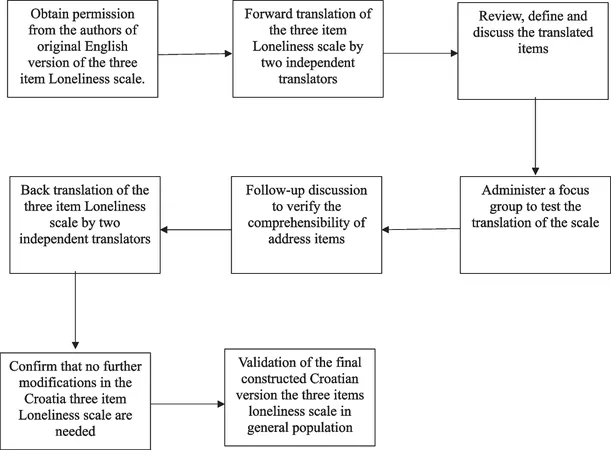
Unlocking Understanding: The Croatian Version of the Three-Item Loneliness Scale Reveals Hidden Social Struggles
2025-04-29
Author: Ming
Loneliness: A Deeply Impactful Emotional Experience
Loneliness is a complex emotional experience, rooted in the gap between the social connections we desire and what we actually have. It's often intertwined with feelings of depression, anxiety, and social isolation, casting a shadow over mental health and even physical well-being. Research consistently shows that prolonged loneliness can lead to serious health issues, including cardiovascular disease and mortality, yet effectively measuring it remains a challenge due to varying definitions and survey tools.
The Need for a Croatian Adaptation
Croatia currently lacks a validated tool for assessing loneliness, hampering efforts to tackle this pressing issue within the country. Cultural and demographic nuances play a significant role, especially amid challenges like an aging population and high youth emigration. Therefore, adapting the UCLA Loneliness Scale for Croatian speakers is crucial for accurately gauging loneliness and informing public health strategies.
Introducing the Three-Item Loneliness Scale
The Three-Item Loneliness Scale is a straightforward self-report measure that captures the essence of loneliness through three key questions. Participants rate their feelings on a simple scale, making it easy to identify the frequency of loneliness. Although widely used in multiple cultures, its Croatian equivalent has not been validated until now.
Rigorous Validation Process Ensured Cultural Fit
Following rigorous translation and validation methods, including expert reviews and community feedback, the Croatian version of the Three-Item Loneliness Scale has been successfully fine-tuned. This culturally sensitive tool is anticipated to aid researchers in understanding the nuances of loneliness in Croatia better.
Participant Insights: Young Adults vs. Older Adults
In a survey of 309 Croatian adults, findings revealed a significant link between social network size and feelings of loneliness. Younger individuals, particularly those aged 18-25, reported a heightened sense of isolation, while older adults (60+) experienced loneliness correlating with the reduction of their social networks. This highlights how different age groups experience loneliness uniquely, necessitating tailored interventions.
The Impact of Social Connectedness
Social connectedness, a mix of engagement, support, and the absence of isolation, acts as a protective factor against loneliness. Individuals with robust social networks tend to report higher life satisfaction and overall well-being. Interestingly, the quantity of social connections was a stronger predictor of reduced loneliness than their diversity or embeddedness, emphasizing the need for community-driven efforts to foster social ties.
Towards Greater Understanding and Intervention
This groundbreaking study not only validates a tool for assessing loneliness in Croatia but also highlights the cultural dimensions of social connectedness and isolation. The necessity for targeted strategies to combat loneliness among diverse age groups is clear, especially in a society balancing both individualistic and collectivist tendencies.
Future Directions: A Call for Continued Research
While the study lays essential groundwork, further research with diverse and representative samples is critical for fully grasping the social landscape of loneliness in Croatia. As we refine our understanding, we can develop more effective interventions that cater to the unique needs of various demographic groups, ultimately fostering a healthier, more connected society.



 Brasil (PT)
Brasil (PT)
 Canada (EN)
Canada (EN)
 Chile (ES)
Chile (ES)
 Česko (CS)
Česko (CS)
 대한민국 (KO)
대한민국 (KO)
 España (ES)
España (ES)
 France (FR)
France (FR)
 Hong Kong (EN)
Hong Kong (EN)
 Italia (IT)
Italia (IT)
 日本 (JA)
日本 (JA)
 Magyarország (HU)
Magyarország (HU)
 Norge (NO)
Norge (NO)
 Polska (PL)
Polska (PL)
 Schweiz (DE)
Schweiz (DE)
 Singapore (EN)
Singapore (EN)
 Sverige (SV)
Sverige (SV)
 Suomi (FI)
Suomi (FI)
 Türkiye (TR)
Türkiye (TR)
 الإمارات العربية المتحدة (AR)
الإمارات العربية المتحدة (AR)